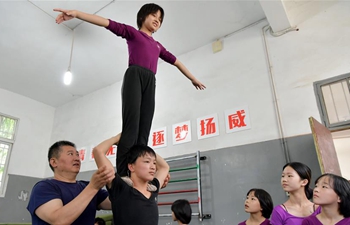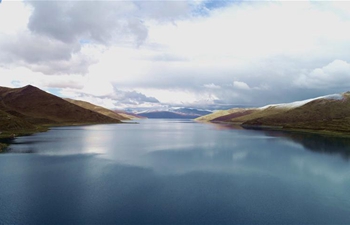FUZHOU, June 2 (Xinhua) -- Jiang Chengcai had never lived in a house until he was 32, when his family gave up living on boat and settled in Ningde City, southeast China's Fujian Province.
Jiang is one of the Tanka people, or boat dwellers. Their origins can be traced back to the ancient aborigines of southern China.
Tanka people traditionally lived on sampans and made a living by fishing in coastal waters in southern China. Historically, the "gypsies of the sea" were not allowed to go ashore or marry the people living along the beach.
Though all discriminatory policies against Tanka people have been eliminated since the founding of the People's Republic of China in 1949, few boat people could ever afford to build a house on land until a government program helped all boat people settle down between 1997 and 2013.
Jiang's craving for houses has led to his current profession -- building homes for land dwellers.
Born in 1967, he is the eldest child in the family. He lived with his three siblings, their parents and their great parents in a 6-meter boat.
Jiang said it was common for three generations to live on the same boat. Everything from weddings to funeral ceremonies were held on the boats.
Typhoons were nightmares. Jiang still remembers when their wooden boat was broken into pieces by huge waves brought about by a strong gale. Hungry and cold, the four children huddled together on a mudflat, with nothing to eat or wear.
When he got married at the age of 20, his parents gave the newlyweds a small sampan to start their own family, in line with Tanka custom.
Modern facilities are impossible in floating homes on the sea. For many nights, Jiang stared at the glimmering lights from houses in the distance, dreaming of living in a house with electricity. His dream came true in 1999.
Since the water tribe have no land, the local government reclaimed mudflats for their relocation. Each boat dweller moving ashore received 650 yuan (about 100 U.S. dollars), which increased to 3,000 yuan by 2013.
There were 18,500 Tanka boat dwellers in Fujian in 1997, and by 2013, all of them had been relocated to houses on the shore. They were arranged in 29 settlements, which gradually evolved into villages.
Electricity, running water, road, telecom and cable TV networks also reached their settlements.
Jiang said that after getting subsidies, he only paid 15,000 yuan to own his house of 200 square meters, almost as much as building a new boat.
He remembered that the day when his family moved in the house was the happiest in his life.
"We had electric light for the first time in our lives. It was like heaven to us," said Jiang.
Xipi Village is one of the largest Tanka communities onshore, accommodating 632 households and a population of 2,716.
Liu Rongquan, who moved into a 3-storey house in the village in 2008, was one of the late comers to the settlement.
Liu said he had worn out at least 6 boats before the family made the move ashore. He just felt sorry that his parents, who had been longing for a settled life on land all their lives, passed away on the sea prior to the move.
Tanka people were once called "Quti," a derogatory term which literally means "bowlegged" because of the bow shape of their legs caused by longtime living in the narrow space of their boats. Now, these bowlegged people are living an upstanding life on the mainland.
Most of the tribe are poorly educated and have difficulty fitting into modern life on shore. They are trained in aquaculture so they can bid farewell to fishing and collecting clams and oysters in mudflats.
Liu Deren, who moved ashore in 1999, said in these training courses he learned to grow oysters on strings hanging from rafts, which now makes him 120,000 yuan a year.
Terrestrial life opened up more possibilities for Tanka people. Jiang said he has mastered the skills of raising razor fish and made a profit of about 400,000 yuan in two years.
"We were poor just because we were born on the sea," said Jiang. "Now that we are on the shore, we can surely build a better life as long as we work hard."
In 2005, he purchased a pile driver and started a construction business. His business did well and he now earns almost one million yuan a year.
After losing some money in fish farming, Liu Rongquan became a seafood dealer, hiring trucks to transport seafood to customers in nearby cities. Illiteracy makes him unable to pass a driving test.
Luckily, his children do not have such worries. Liu is glad that his eldest son will graduate from a college in Xiamen this summer and plans to look for an office work. Over two decades, more than 150 young villagers in Xipi have received college education.
"The word Tanka is history. Now there is no difference between us and land dwellers," said Jiang. "But our adventurous spirit should be passed on along with the traditions that we are proud of."
He said many young people have abandoned accent and words unique to Tanka people. The traditions, such as folk music, are also dying out. What they are doing now is to put their boats, old household necessities and old photos on exhibition.

















